December 29, 2020
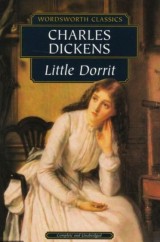 I can’t believe it’s the end of 2020 (a crappy year, as you know, with some redeeming factors), which means there have been, well, 2,020 years plus a few more years of recorded Western history (I’m not here to debate history, and realize I’m generalizing in a big way, but hey, I write about drinks), and in all those years I haven’t had a Cocktail Talk from the immortal Dicken’s classic Little Dorrit! That’s an outrage! What have I been thinking? I haven’t, obviously. While Little Dorrit isn’t my all-time favorite Dickens, it’s definitely in the middle-high range, and as I love most all Dickens books a heck of a lot, that’s saying something! Be sure to read all the Dickens Cocktail Talks to hear more. But be sure to come back, too, cause you don’t want to miss these quotes from Dickens fairly-dark novel that’s unflinching in its views of his society (which is remarkably like ours, in some sad ways), while still being wonderfully comic, character-driven, lyric, and descriptive, with layers of stories that disconnect and then connect again and characters you won’t easily forget. Dickens! And, of course, there are some drinks, as he liked drinks and pubs like few other authors. Our first Little Dorrit Cocktail Talk – and there will be more, don’t you fret – features the hero (in a way of speaking) of the book, Arthur Clennam, sitting down for dinner with a now-much-changed love from his youth, and with her father.
I can’t believe it’s the end of 2020 (a crappy year, as you know, with some redeeming factors), which means there have been, well, 2,020 years plus a few more years of recorded Western history (I’m not here to debate history, and realize I’m generalizing in a big way, but hey, I write about drinks), and in all those years I haven’t had a Cocktail Talk from the immortal Dicken’s classic Little Dorrit! That’s an outrage! What have I been thinking? I haven’t, obviously. While Little Dorrit isn’t my all-time favorite Dickens, it’s definitely in the middle-high range, and as I love most all Dickens books a heck of a lot, that’s saying something! Be sure to read all the Dickens Cocktail Talks to hear more. But be sure to come back, too, cause you don’t want to miss these quotes from Dickens fairly-dark novel that’s unflinching in its views of his society (which is remarkably like ours, in some sad ways), while still being wonderfully comic, character-driven, lyric, and descriptive, with layers of stories that disconnect and then connect again and characters you won’t easily forget. Dickens! And, of course, there are some drinks, as he liked drinks and pubs like few other authors. Our first Little Dorrit Cocktail Talk – and there will be more, don’t you fret – features the hero (in a way of speaking) of the book, Arthur Clennam, sitting down for dinner with a now-much-changed love from his youth, and with her father.
Once upon a time Clennam had sat at that table taking no heed of anything but Flora; now the principal heed he took of Flora was to observe, against his will, that she was very fond of porter, that she combined a great deal of sherry with sentiment, and that if she were a little overgrown, it was upon substantial grounds. The last of the Patriarchs had always been a mighty eater, and he disposed of an immense quantity of solid food with the benignity of a good soul who was feeding some one else.
— Charles Dickens, Little Dorrit
Tags: Arthur Clennam, Charles Dickens, Cocktail Talk, Little Dorrit, Part I, port, she combined a great deal of sherry with sentiment, sherry
Posted in: beer, Charles Dickens, Cocktail Talk, Sherry
December 15, 2020
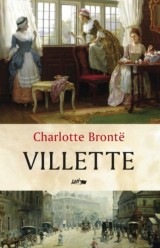 Just over twelve years ago, life was a little different. We were younger, of course, and, electricity hadn’t been invented, and dinosaurs walked the earth, and Atlantis still stood strong, and well, it feels that long ago, at least, doesn’t it? But that (back in 2008) was when I last read what some consider to be Charlotte Bronte’s best novel, Villette. How do I know that fact? Cause I had a Villette Cocktail Talk way back then! Amazing, right? Amazing. I decided to delve back into the book when in a CB mood recently, and found the below quote I must have missed first time, one that’s ideal for right now as it features Wassail, a traditional holiday drink in many parts of the globe. Oh, but before that – in my earlier Cocktail Talk I said Villette was in France, but I think I’d spent too much time around the Wassail-bowl, cause really, it’s a stand-in name I believe for Brussels. Oh, also, if you haven’t read it, Villette is a somewhat reflection of part of C. Bronte’s life, and presents a picture different than many books written at the time, as the heroine is way independent for the time period, and caused a fair amount of disapproving looks at the time – though some highly approved, and I do too! Oh (part three of the “Oh”-ing), I have one or two more Charlotte Bronte Cocktail Talks, too, so don’t miss them.
Just over twelve years ago, life was a little different. We were younger, of course, and, electricity hadn’t been invented, and dinosaurs walked the earth, and Atlantis still stood strong, and well, it feels that long ago, at least, doesn’t it? But that (back in 2008) was when I last read what some consider to be Charlotte Bronte’s best novel, Villette. How do I know that fact? Cause I had a Villette Cocktail Talk way back then! Amazing, right? Amazing. I decided to delve back into the book when in a CB mood recently, and found the below quote I must have missed first time, one that’s ideal for right now as it features Wassail, a traditional holiday drink in many parts of the globe. Oh, but before that – in my earlier Cocktail Talk I said Villette was in France, but I think I’d spent too much time around the Wassail-bowl, cause really, it’s a stand-in name I believe for Brussels. Oh, also, if you haven’t read it, Villette is a somewhat reflection of part of C. Bronte’s life, and presents a picture different than many books written at the time, as the heroine is way independent for the time period, and caused a fair amount of disapproving looks at the time – though some highly approved, and I do too! Oh (part three of the “Oh”-ing), I have one or two more Charlotte Bronte Cocktail Talks, too, so don’t miss them.
So, while the Count stood by the fire, and Paulina Mary still danced to and fro—happy in the liberty of the wide hall-like kitchen—Mrs. Bretton herself instructed Martha to spice and heat the wassail-bowl, and, pouring the draught into a Bretton flagon, it was served round, steaming hot, by means of a small silver vessel, which I recognized as Graham’s christening-cup.
“Here’s to Auld Lang Syne!” said the Count; holding the glancing cup on high.
— Charlotte Bronte, Villette
December 8, 2020
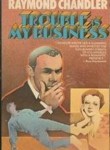 Well, it’s nearly time after a fair number of swell quotes to say so-long (for now – he’ll be back) to Raymond Chandler, with one last Cocktail Talk from a story within the collection Trouble Is My Business and Other Stories, this time “Red Wind,” which starts with the below quote that has a wind indeed in it. It’s a twisty kind of tall, beginning with that wind and a bar that’s across the street from Chandler’s PI Philip Marlowe’s apartment. Then there’s a lady, various angles, and lots of gumshoe-ing. Start it off with the below, and then read the whole story whydontcha? Oh, and also don’t miss all the other Raymond Chandler Cocktail Talks, cause you deserve to read them.
Well, it’s nearly time after a fair number of swell quotes to say so-long (for now – he’ll be back) to Raymond Chandler, with one last Cocktail Talk from a story within the collection Trouble Is My Business and Other Stories, this time “Red Wind,” which starts with the below quote that has a wind indeed in it. It’s a twisty kind of tall, beginning with that wind and a bar that’s across the street from Chandler’s PI Philip Marlowe’s apartment. Then there’s a lady, various angles, and lots of gumshoe-ing. Start it off with the below, and then read the whole story whydontcha? Oh, and also don’t miss all the other Raymond Chandler Cocktail Talks, cause you deserve to read them.
There was a desert wind blowing that night. It was one of those hot dry Santa Anas that come down through the mountain passes and curl your hair and make your nerves jump and your skin itch. On nights like that, meek little wives feel the edge of the carving knife and study their husbands’ necks. Anything can happen. You can even get a full glass of beer at a cocktail lounge.
I was getting one in a flossy new place across the street from the apartment house where I lived. It had been open about a week and it wasn’t doing any business. The kid behind the bar was in his early twenties and looked as if he had never had a drink in his life.
–Raymond Chandler, “Red Wind”
December 1, 2020
 As said in the “Goldfish” Cocktail Talk Part I, this particular Raymond Chandler story (from the Trouble Is My Business and Other Stories collection, and also don’t miss the “Trouble Is My Business” Part I and Part II Cocktail Talks, and for that matter, don’t miss other past Raymond Chandler Cocktail Talks) winds its way eventually up the coast all the way to Seattle, and so is nearly automatically near-and-dear to me. But it starts down the coast a ways, and also starts a little rough for one character (that’s your warning – the below quote is a little, oh, violent at the beginning), but then heads to Brooklyn. With Brooklyn Scotch, which, I have to admit, I’ve never heard of! So, now I’m very curious, and hoping the below makes you curious, too, and that curiosity leads to some Brooklyn Scotch history.
As said in the “Goldfish” Cocktail Talk Part I, this particular Raymond Chandler story (from the Trouble Is My Business and Other Stories collection, and also don’t miss the “Trouble Is My Business” Part I and Part II Cocktail Talks, and for that matter, don’t miss other past Raymond Chandler Cocktail Talks) winds its way eventually up the coast all the way to Seattle, and so is nearly automatically near-and-dear to me. But it starts down the coast a ways, and also starts a little rough for one character (that’s your warning – the below quote is a little, oh, violent at the beginning), but then heads to Brooklyn. With Brooklyn Scotch, which, I have to admit, I’ve never heard of! So, now I’m very curious, and hoping the below makes you curious, too, and that curiosity leads to some Brooklyn Scotch history.
They had been burned raw on the soles. There was a smell of scorched flesh in spite of the open window. Also, a smell of scorched wood. An electric iron on a desk was still connected. I went over and shut it off.
I went back to Kathy Home’s kitchen and found a pint of Brooklyn Scotch in the cooler. I used some of it and breathed deeply for a little while and looked out over the vacant lots. There was a narrow cement walk behind the house and green wooden steps down to the street.
–Raymond Chandler, “Goldfish”
November 24, 2020
 We’re still taking our fall tour along Raymond Chandler lane (don’t miss the “Trouble Is My Business” Part I and Part II Cocktail Talks), with Raymond Chandler of course, and have now made it to Seattle – which, coincidentally, is where I tend to sometimes hang my hat. So, as you can imagine, when I read the story “Goldfish,” in the book Trouble Is My Business and Other Stories, and Chandler’s PI Philip Marlowe ended up heading to Seattle, WA, well, I was tickled. And then they drank apple brandy! And then fish, and before that a mystery long-told, and I won’t want to say anymore cause you need to read the story – if I haven’t sold it, this quote will.
We’re still taking our fall tour along Raymond Chandler lane (don’t miss the “Trouble Is My Business” Part I and Part II Cocktail Talks), with Raymond Chandler of course, and have now made it to Seattle – which, coincidentally, is where I tend to sometimes hang my hat. So, as you can imagine, when I read the story “Goldfish,” in the book Trouble Is My Business and Other Stories, and Chandler’s PI Philip Marlowe ended up heading to Seattle, WA, well, I was tickled. And then they drank apple brandy! And then fish, and before that a mystery long-told, and I won’t want to say anymore cause you need to read the story – if I haven’t sold it, this quote will.
“Too early for apple brandy, ain’t it?” he whispered.
I told him how wrong he was. He went away again and came back with glasses and a quart of clear amber fluid. He sat down with me and poured. A rich baritone voice in the kitchen was singing “Chloe,” over the sizzling.
We clinked glasses and drank and waited for the heat to crawl up our spines.
“Stranger, ain’t you?” the little man asked.
I said I was.
“From Seattle maybe? That’s a nice piece of goods you got on.”
“Seattle,” I agreed.
— Raymond Chandler, “Goldfish”
November 17, 2020
 Well, when I earlier (as in last week pals) had a “Trouble is My Business” Cocktail Talk post, I’ll bet those of you who bet made a bet at your local bookie that I’d have another one on its heels, and, well, here we are! I feel we’re gonna spend a few weeks with Mr. Chandler and Mr. Marlowe now that we’ve opened the tab. But let’s not get ahead of ourselves! Today, we’d still in the story “Trouble is My Business,” and we’re still in Scotch land – not a bad land to be within.
Well, when I earlier (as in last week pals) had a “Trouble is My Business” Cocktail Talk post, I’ll bet those of you who bet made a bet at your local bookie that I’d have another one on its heels, and, well, here we are! I feel we’re gonna spend a few weeks with Mr. Chandler and Mr. Marlowe now that we’ve opened the tab. But let’s not get ahead of ourselves! Today, we’d still in the story “Trouble is My Business,” and we’re still in Scotch land – not a bad land to be within.
He opened the door, went out, shut it, and I sat there still holding the telephone, with my mouth open and nothing in it but my tongue and a bad taste on that.
I went out to the kitchen and shook the Scotch bottle, but it was still empty. I opened some rye and swallowed a drink and it tasted sour. Something was bothering me. I had a feeling it was going to bother me a lot more before I was through.
–Raymond Chandler, Trouble is My Business
November 10, 2020
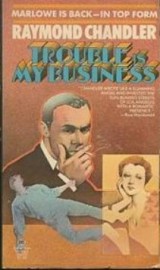 He’s been relentlessly imitated (poorly, in the main), some dated by the years, and translated much in language and form, but somedays, you just get the urge to read a little of the real Raymond Chandler and slip into the gumshoe world of Philip Marlowe. At least I do! And recently I did take said slip and slipped into a few stories staring such and written by such. I’m not sure much intro is needed – if you don’t know Chandler, then let me say there’s not much I can say that hasn’t been said better by others, or even turned into a film that does the same. Let me just say that the book I picked up (I have pretty much the whole hard-boiled batch) is a story collection headlined by the story “Trouble is My Business,” and the below quote is from the same story, and is about talking and drinking Scotch, and that you should read past Raymond Chandler Cocktail Talks.
He’s been relentlessly imitated (poorly, in the main), some dated by the years, and translated much in language and form, but somedays, you just get the urge to read a little of the real Raymond Chandler and slip into the gumshoe world of Philip Marlowe. At least I do! And recently I did take said slip and slipped into a few stories staring such and written by such. I’m not sure much intro is needed – if you don’t know Chandler, then let me say there’s not much I can say that hasn’t been said better by others, or even turned into a film that does the same. Let me just say that the book I picked up (I have pretty much the whole hard-boiled batch) is a story collection headlined by the story “Trouble is My Business,” and the below quote is from the same story, and is about talking and drinking Scotch, and that you should read past Raymond Chandler Cocktail Talks.
“She laughed disinterestedly and I slid past the end of her cigarette into a long rather narrow room with plenty of nice furniture, plenty of windows, plenty of drapes, plenty of everything. A fire blazed behind a screen, a big log on top of a gas teaser. There was a silk Oriental rug in front of a nice rose davenport in front of the nice fire, and beside that there was Scotch and swish on a tabouret, ice in a bucket, everything to make a man feel at home.
“You’d better have a drink,” she said. “You probably can’t talk without a glass in your hand.”
I sat down and reached for the Scotch. The girl sat in a deep chair and crossed her knees.
–Raymond Chandler, Trouble is My Business
October 27, 2020
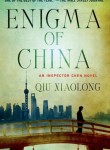 Recently (just last week!) I had a Cocktail Talk from Qiu Xiaolong’s Death of a Red Heroine, which if you missed, you should read, and in the past, I’ve had Qiu Xiaolong Cocktail Talks, from it as well as other books featuring Xiaolong’s Chief Inspector Chen (and his partner Detective Yu, and other reoccurring characters), and you should read those Cocktail Talks, too, as well as reading the books they come from, if you’re interested in well-written mysteries, modern Chinese cultural expositions, classical Chinese poetry, or food, because all of that flows through the books like fine wine. Enigma of China is nearer the latter stages of the series (to date), and is a definite page turner. But where we’re Cocktail Talking from today is a part focused a little more on Wang Xizi than modern day, Wang being a poet from the Jin dynasty. Chen is visiting a place famous for Wang associations, and talks about a wine-poem game Wang and other poets played. A wine-poem game!
Recently (just last week!) I had a Cocktail Talk from Qiu Xiaolong’s Death of a Red Heroine, which if you missed, you should read, and in the past, I’ve had Qiu Xiaolong Cocktail Talks, from it as well as other books featuring Xiaolong’s Chief Inspector Chen (and his partner Detective Yu, and other reoccurring characters), and you should read those Cocktail Talks, too, as well as reading the books they come from, if you’re interested in well-written mysteries, modern Chinese cultural expositions, classical Chinese poetry, or food, because all of that flows through the books like fine wine. Enigma of China is nearer the latter stages of the series (to date), and is a definite page turner. But where we’re Cocktail Talking from today is a part focused a little more on Wang Xizi than modern day, Wang being a poet from the Jin dynasty. Chen is visiting a place famous for Wang associations, and talks about a wine-poem game Wang and other poets played. A wine-poem game!
“It’s here. This is Lanting,” he exclaimed. “Wang and the other poets gathered at this stream, engaged in a wine-poem game.”
“A wine-poem game?
“They let wine cups flow down from the head of the stream. If a cup came to a stop in front of someone, he had to write a poem. If he failed to do so, he had to drink three cups as punishment. The poems were then collected, and Want composed a preface to the collection. He must have been very drunk, flourishing his brush pen inspired by the exquisite scene.
–Qiu Xiaolong, Enigma of China
 I can’t believe it’s the end of 2020 (a crappy year, as you know, with some redeeming factors), which means there have been, well, 2,020 years plus a few more years of recorded Western history (I’m not here to debate history, and realize I’m generalizing in a big way, but hey, I write about drinks), and in all those years I haven’t had a Cocktail Talk from the immortal Dicken’s classic Little Dorrit! That’s an outrage! What have I been thinking? I haven’t, obviously. While Little Dorrit isn’t my all-time favorite Dickens, it’s definitely in the middle-high range, and as I love most all Dickens books a heck of a lot, that’s saying something! Be sure to read all the Dickens Cocktail Talks to hear more. But be sure to come back, too, cause you don’t want to miss these quotes from Dickens fairly-dark novel that’s unflinching in its views of his society (which is remarkably like ours, in some sad ways), while still being wonderfully comic, character-driven, lyric, and descriptive, with layers of stories that disconnect and then connect again and characters you won’t easily forget. Dickens! And, of course, there are some drinks, as he liked drinks and pubs like few other authors. Our first Little Dorrit Cocktail Talk – and there will be more, don’t you fret – features the hero (in a way of speaking) of the book, Arthur Clennam, sitting down for dinner with a now-much-changed love from his youth, and with her father.
I can’t believe it’s the end of 2020 (a crappy year, as you know, with some redeeming factors), which means there have been, well, 2,020 years plus a few more years of recorded Western history (I’m not here to debate history, and realize I’m generalizing in a big way, but hey, I write about drinks), and in all those years I haven’t had a Cocktail Talk from the immortal Dicken’s classic Little Dorrit! That’s an outrage! What have I been thinking? I haven’t, obviously. While Little Dorrit isn’t my all-time favorite Dickens, it’s definitely in the middle-high range, and as I love most all Dickens books a heck of a lot, that’s saying something! Be sure to read all the Dickens Cocktail Talks to hear more. But be sure to come back, too, cause you don’t want to miss these quotes from Dickens fairly-dark novel that’s unflinching in its views of his society (which is remarkably like ours, in some sad ways), while still being wonderfully comic, character-driven, lyric, and descriptive, with layers of stories that disconnect and then connect again and characters you won’t easily forget. Dickens! And, of course, there are some drinks, as he liked drinks and pubs like few other authors. Our first Little Dorrit Cocktail Talk – and there will be more, don’t you fret – features the hero (in a way of speaking) of the book, Arthur Clennam, sitting down for dinner with a now-much-changed love from his youth, and with her father.
























